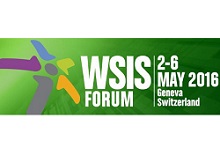E-health and e-agriculture: ICT applications for achieving SDGs
2 May 2016 16:30h
Event report
[Read more session reports and live updates from the WSIS Forum 2016.]
The session, organised by the World Health Organization (WHO), the Food and Agriculture Organization (FAO), the International Telecommunication Union (ITU), and the European Internet Inclusion Initiative, discussed how technology can address multiple challenges at the same time. It was chaired by Mr Mohammed Althaher with Ms Patricia Schlageter (ITU) hosting remote participants.
Ms Sophie Treinen (FAO) addressed how ICTs have contributed to achieving eradication of hunger and food insecurity through knowledge sharing and access to scientific literature through Research for Life; disease control; advisory services; remote sensing and monitoring; and governance of tenure.
Mr Ousmane Ly (Director of National Telehealth and Medical informatics Agency, Mali) presented on the integrated roles of digital health information systems in wasting management. He elaborated on how ICT has help in tackling issues of malnutrition in Somalia.
The final main speaker, Mr Thomas Lamanauskas (Vimpelcom), spoke about operators and platforms for development. He emphasised how operators are moving from traditional telecommunications to customer-oriented digital service providers such as e-commerce, mobile finance, and mobile education.
WSIS project prize winners explained how their software has contributed to achieving the millennium development goals (MDGs).
Mr Pukkawat Lesawaa (Advanced Info Services (AIS), Thailand) developed the City-to-Farm Agriculture Assisting (CFAA) service and specifically highlighted how ICT addresses multiple interlinked goals at the same time, maximising and accelerating their impact by overcoming traditional silos that favor the duplication of efforts and fail to adopt a holistic approach to address development challenges.
Dr Margaret Bernard (Senior Lecturer in Computing Science, Department of Computing and Information Technology, and Dean (Graduate Studies and Research), Faculty of Science and Technology, The University of the West Indies, St Augustine, Trinidad and Tobago) developed AgriNeTT. The AgriNeTT project aligns with the UN’s SDG2 of achieving food security and promoting sustainable agriculture. AgriNeTT, working along with government agencies, aims to increase agriculture productivity and the incomes of small-scale farmers, especially women, youth, and family farmers.
Mr Hussein Gadain (Chief Technical Advisor of Somalia Water and Land Information Management (SWALIM)) discussed the potential of ICT as a cross-cutting enabler to address the multifaceted nature of nutrition by enhancing agricultural systems, improving access to healthy diets, improving knowledge for food choices, increasing resilience of food systems to economic, climatic and human-made shocks, and remediating food-borne threats to consumers. SWALIM is a web-enabled data platform designed to improve information management of land and water resources. It also includes an SMS mobile-phone-based early warning system for vulnerable communities.
by James Adzamli
Related topics
Related event

